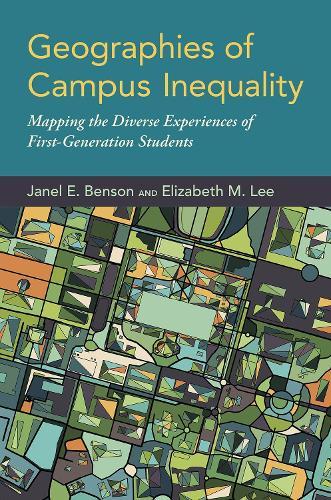Overview
In efforts to improve equity, selective college campuses are increasingly focused on recruiting and retaining first-generation students-those whose parents have not graduated from college. In Geographies of Campus Inequality, sociologists Benson and Lee argue that these approaches may fall short if they fail to consider the complex ways first-generation status intersects with race, ethnicity, and gender. Drawing on interview and survey data from selective campuses, the authors show that first-generation students do not share a universal experience. Rather, first-generation students occupy one of four disparate geographies on campus within which they negotiate academic responsibilities, build relationships, engage in campus life, and develop post-college aspirations. Importantly, the authors demonstrate how geographies are shaped by organizational practices and campus constructions of class, race, and gender. Geographies of Campus Inequality expands the understanding of first-generation students' campus lives and opportunities for mobility by showing there is more than one way to be first-generation.
Full Product Details
Author: Janel E. Benson (Professor of Sociology, Professor of Sociology, Colgate University) ,
Elizabeth M. Lee (Assistant Professor of Sociology, Assistant Professor of Sociology, Saint Joseph's University)
Publisher: Oxford University Press Inc
Imprint: Oxford University Press Inc
Dimensions:
Width: 15.50cm
, Height: 2.30cm
, Length: 23.60cm
Weight: 0.454kg
ISBN: 9780190848156
ISBN 10: 0190848154
Pages: 216
Publication Date: 22 September 2020
Audience:
Professional and scholarly
,
Professional & Vocational
Format: Hardback
Publisher's Status: Active
Availability: To order

Stock availability from the supplier is unknown. We will order it for you and ship this item to you once it is received by us.
Reviews
This thoroughgoing analysis should be of considerable value to college counseling personnel hoping to better serve their resident students and promote more enhanced adjustments at their colleges. -- CHOICE For far too long, researchers have painted the first-generation college student experience with a single brush. Benson and Lee correct this view, revealing the varied ways that first-generation students navigate college. This book is rigorous, engaging, and a must-read for anyone interested in how class plays out on campus. -- Jessi Streib, Assistant Professor of Sociology, Duke University and author of Privilege Lost and The Power of the Past This book aims to complicate readers' understandings of first-generation college students and their typical campus experiences. The authors accomplish this by highlighting the intersections of race, ethnicity, and gender among these students as they navigate divergent campus geographies. This book is essential reading for anyone interested in understanding and ameliorating inequality among undergraduates at selective post-secondary institutions. --Rachelle J. Brunn-Bevel, Associate Professor, Fairfield University, Editor of Intersectionality and Higher Education: Identity and Inequality on College Campuses and Intersectionality in Educational Research
Author Information
Janel E. Benson is Associate Professor of Sociology at Colgate University. Her research investigates sources of risk and resiliency in the transition from early adolescence to young adulthood to understand how contexts of development in early life shape identity, health, and social mobility. As a first-generation student, she is dedicated to mentoring other students who are first in their families to attend college through the A Better Chance program in Fayetteville-Manlius. Elizabeth M. Lee is Assistant Professor of Sociology at Saint Joseph's University. Her research examines class inequality, primarily within higher education settings. Much of her research focuses on how low-income, first-generation, and/or working-class (LIFGWC) college students at selective campuses manage class inequality among their peers through day to day interactions and relationships. Other work focuses on faculty members from LIFGWC backgrounds and on how students interact with their campus structures.




